
On April 21, 2022, 17 months after New Jersey voters approved the referendum to legalize cannabis, the market formally opened in the state. Initially, not all cities were on board. Back in August 2021, an estimated 70% of municipalities had opted out of allowing legal adult-use cannabis businesses to operate within their limits. With opportunities for tax revenue and economic growth, however, twenty-two of those have since decided to allow retail sales and more continue to change direction.
The New Jersey Cannabis Regulatory Commission (CRC) says the state’s 13 licensed dispensaries are bringing in about $5 million in sales per week. Second quarter sales for adult-use cannabis is nearly $80 million dollars. MJBizDaily estimates 2022 sales to reach $775 million and exceed $2 billion within the next five years. With 170 dispensary applications submitted on the first day of licensing, the New Jersey cannabis market is poised to meet or exceed that goal and become one of the most robust cannabis markets on the East Coast.
Whether you’re an active operator or investor, or if you’re considering getting into the business of cannabis in the Garden State, in the following we’ll provide everything you need to know to become better acquainted with cannabis in New Jersey:
• History – The history and timeline of cannabis legalization
• Licensing – License types at the state and local levels, how they differ, where to find help
• Taxation – Details on the current status of state, local, and additional taxes
• Market Analysis – Current atmosphere of cannabis and where it’s headed
Since legalized adult-use cannabis is only a few months old, everyone is learning how to navigate the processes. There are companies who have been operating in New Jersey with medical-use licenses, which lays some of the foundation, but adult-use licensing and compliance are more complex. Plentiful opportunities exist for those ready to take on the task.
How We Got Here: Short History of Cannabis in New Jersey
The path to cannabis legalization in New Jersey has been quite bumpy. On January 10, 2010, then-Governor John Corzine, on his last day in office, signed several bills into law, one of them being the Compassionate Use Medical Marijuana Act (CUMMA). However, newly elected Governor Chris Christie immediately took action to stall legalization. It wasn’t until 2013, when Governor Christie finally signed SB 2842 allowing adult and minor patients to purchase dried cannabis, oils, and edibles for medical use.
Flash forward to November 2020, voters approved adult-use usage legislation, but it was delayed several months before it became law. So much so that in May 2022 ― a month after cannabis was finally legalized ― the state’s Senate Judiciary held a hearing to investigate the delayed rollout of the adult-use program.

Current issues in the New Jersey cannabis market
Employer drug testing
Under the New Jersey Cannabis Regulatory, Enforcement Assistance, and Marketplace Modernization Act (CREAMMA), an employer may not take adverse action against an employee for the employee's use of cannabis in a fashion permitted under CREAMMA absent a drug and alcohol free policy.
The New Jersey CRC has provided very little guidance on how to navigate issues around employer drug testing. While required to adopt standards for a Workplace Impairment Recognition Expert (WIRE), the CRC must work with the Police Training Commission to develop standards for a WIRE certification. However, the CRC is responsible for developing the regulations for the certification and they have yet to do so.
Cooked or baked edibles are not legal
Although gummies are currently available, other types of edibles (brownies, cookies, or other baked or cooked items) are still unavailable. Concerned about how/where these items are made and how tempting they are to children, lawmakers want address these issues before legalizing sales of these types of products. Some are hopeful that the Legislature will approve baked-goods edibles by the end of the summer 2022.
New Jersey continues to work through these roadblocks, however complete legalization will most likely take a few years.
Cannabis licensing in New Jersey
According to the New Jersey CRC website, licenses are issued for medicinal and adult-use cannabis business operations. Each business requires a license, which must be active and in good standing, to perform any commercial cannabis activity.
While there are seven license types, currently the state of New Jersey is only accepting applications for the following four types:
• Class 1 Cultivator Licenses – limited to 37 licenses until February 22, 2023
• Class 2 Manufacturer Licenses – no limit
• Class 5 Retailers – no limit
• Testing Laboratories – no limit
Although the state is only accepting these types of applications, the four largest municipalities in the state are accepting license applications for all types of licenses. This has created some confusion for operators and investors as it is unclear when the state will allow the additional license types to go live.
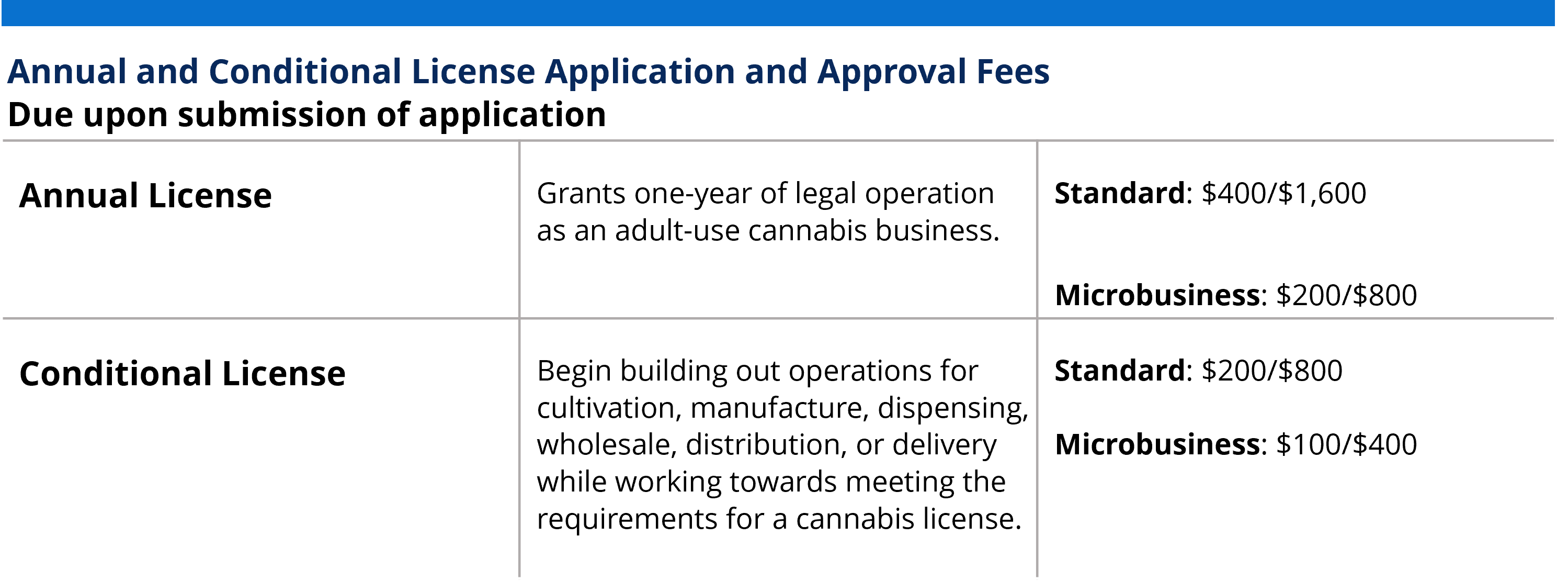
New Jersey Cannabis license types and fees
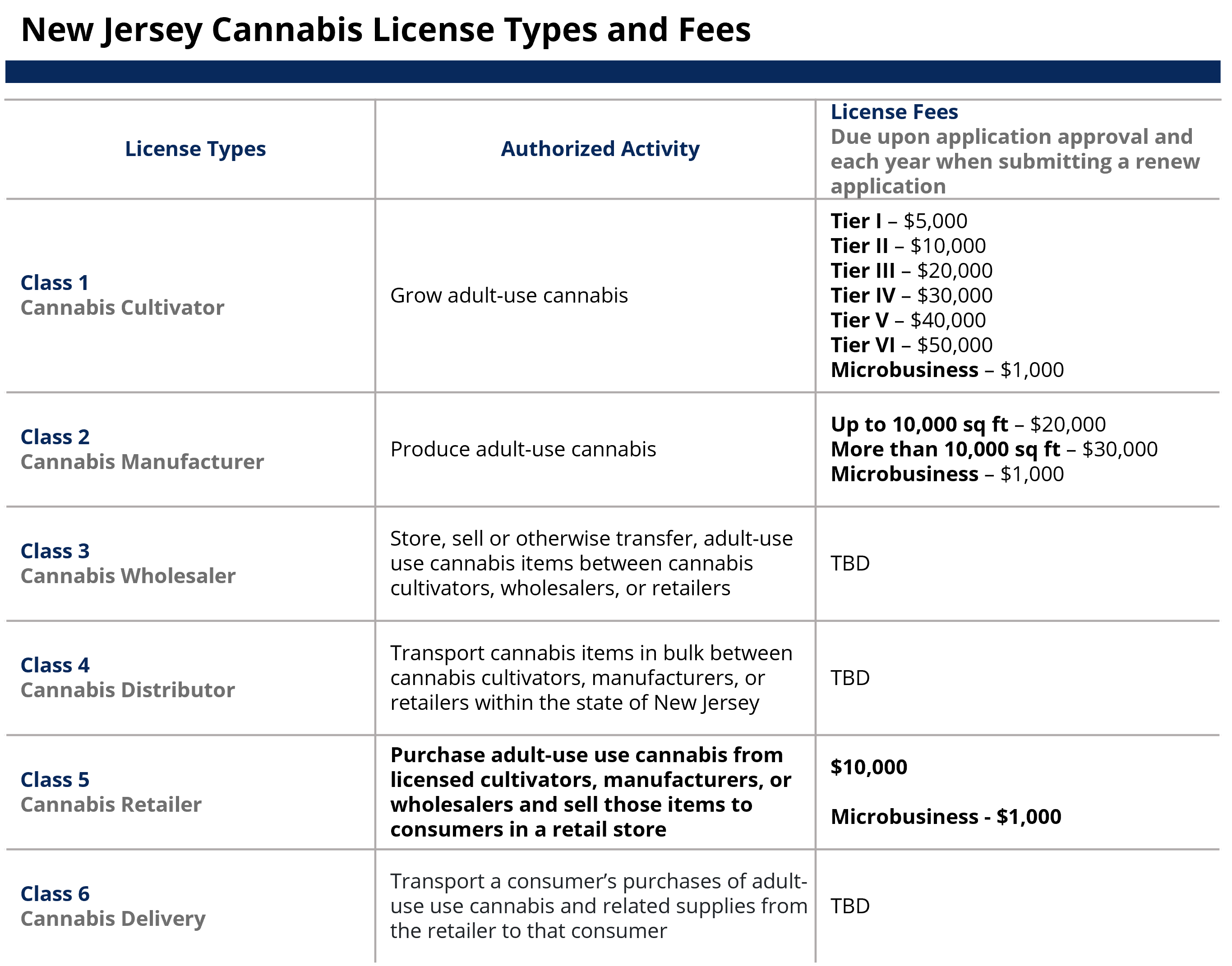
NOTE: A microbusiness is a licensed cannabis cultivator, manufacturer, distributor, retailer, or delivery service that meets these requirements:
• No more than 10 employees at one time;
• Physical plant of no more than 2,500 square feet
• Canopy height of no more than 24 feet;
• Possess no more than 1,000 mature cannabis plants each month (cannabis distributors are exempt)
• Acquire no more than 1,000 pounds of usable cannabis (or the equivalent amount in other forms) each month
License applications are currently accepted and reviewed on a rolling basis. Priority applications from social equity businesses, diversely owned businesses, impact zone businesses, and applications that receive bonus points will be afforded priority review, scoring, and approval.
Upon a provisional/conditional award, applicants have 120 days to complete the remaining requirements to obtain an annual license. If an applicant has all the required information, they can apply for an annual license.
License preparation
Before applying for a license, determine what type of business you want to establish; look into the municipal regulations regarding cannabis business where you intend to establish your business; determine whether you qualify as a priority applicant; check off all the items on the pre-application check list; read through the Application Guide and review the Application Platform demo video.
The state has provided a handy document, “10 Ways to Prepare for Submitting Your Applications” to help applicants through the steps needed to submit your application. But even with this guidance, getting all the required documentation in place before you apply ― at both the state and local levels ― is time consuming.
New Jersey State Cannabis Tax Laws
Each state has their own tax limits as well as how tax revenue is allocated. At the high end, there’s Washington State with a 37% tax. At the low end are Alaska, Montana, and Oregon, which don’t tax adult-use cannabis. New Jersey’s state sales tax rate comes in at the lower range at 6.625%; municipalities who have legalized adult-use cannabis can charge up to an additional two percent.
New Jersey Cannabis Tax Regime:
Sales and use tax
Sales of adult-use cannabis are subject to the state sales tax rate of 6.625%. Medical cannabis is tax-free as of July 1, 2022. You must file a monthly Sales Tax return (Form ST-51) only if the amount of tax due for the month is more than $500; and you collected more than $30,000 in Sales and Use Tax in New Jersey during the preceding calendar year (January 1 – December 31).
Payment: Quarterly Sales and Use Tax Returns are due before 11:59 p.m. on the 20th day of the month after the end of the filing period. If the due date falls on a weekend or legal holiday, the return and payment are due on the following business day. You do not have to wait until the due date to file. You can file your return early for the current quarter and schedule a future payment on or before the return due date.
In addition to the quarterly return, you may also be required to make monthly payments. Monthly payments are remitted by filing a monthly return (Form ST-51).
Social equity excise fee
$1.10 per ounce of cannabis. Imposed on receipts from the sale, or equivalent value of the transfer of usable cannabis by cannabis cultivator to any other type of cannabis establishment (e.g., manufacturer, distributor, retailer). It does not apply to transactions between a cannabis cultivator to another cannabis cultivator; or a licensed medical cannabis business.
The law stipulates that 100 percent of this excise fee and nearly 60 percent of sales tax from cannabis must fund community reinvestment. Returns are generally due quarterly in April, July, October, and January.
Payment: Form SF-100 and fee payment are due by 11:59 p.m. on the 20th day of the month after the end of the filing period. If the due date falls on a weekend or legal holiday, the return and payment are due on the following business day.
NOTE: The monthly form must be filed even if no sales or transfers of usable cannabis occur.
Local cannabis transfer tax
Each municipality sets its own rates, but in no case will a rate exceed two percent of the receipts from each sale by a cannabis cultivator, manufacturer, retailer; or one percent of the receipts from each sale by a cannabis wholesaler.
Payment: These taxes vary from town to town so check with your local municipality or work with a qualified cannabis tax professional.
Changes to New Jersey Cannabis tax laws
Some states with a long history of legal adult-use cannabis are making changes to their tax laws. Some of these changes are positive: like California recently removing their cannabis cultivation tax and shifting their excise tax from distributors to retailers, and are providing additional credits. Other of these changes are less positive: Colorado recently imposed a retail delivery fee on all cannabis deliveries by motor vehicles.
On July 1, 2022, New Jersey made a significant change in its taxation requirements by eliminating tax for medicinal cannabis patients. The tax environment in New Jersey continues to be fluid. It is essential to stay current with tax issues that may affect you and your business.
New Jersey Cannabis Market Analysis
New Jersey is the fourth smallest state by area but boasts the densest population and is ranked as one of the most diverse states in the country. Additionally, it borders the highly populated states of New York and Pennsylvania, which do not currently have legal adult-use cannabis markets. These factors ― along with current revenue reports and projections ― position New Jersey to be a fast-growing market with tremendous profitability potential.
As we have seen in many new markets, the cannabis regulatory regime is in its infancy and remains quite confusing. Several issues remain, including, for example, cities offering more licensing classes than the state, not all cities or counties legalizing it, or lack of clarity from both the state and localities on their respective regulatory guidelines. These issues will stymie growth initially, but the long-term view for New Jersey is very promising.
To date, over a dozen dispensaries are licensed to sell adult-use cannabis in New Jersey, with no cap on Class 5 Retailer licenses. This leaves a largely untapped market with room to grow. Currently, only four of the top six counties and four of the five largest cities have legalized adult-use cannabis.
Some municipalities’ licenses are based on Class criteria, although at least one other municipality ― the City of Elizabeth ― is regulating the location and proximity of cannabis establishments and distributors through zoning.
New Jersey Largest Cities and Cannabis Legalization Status
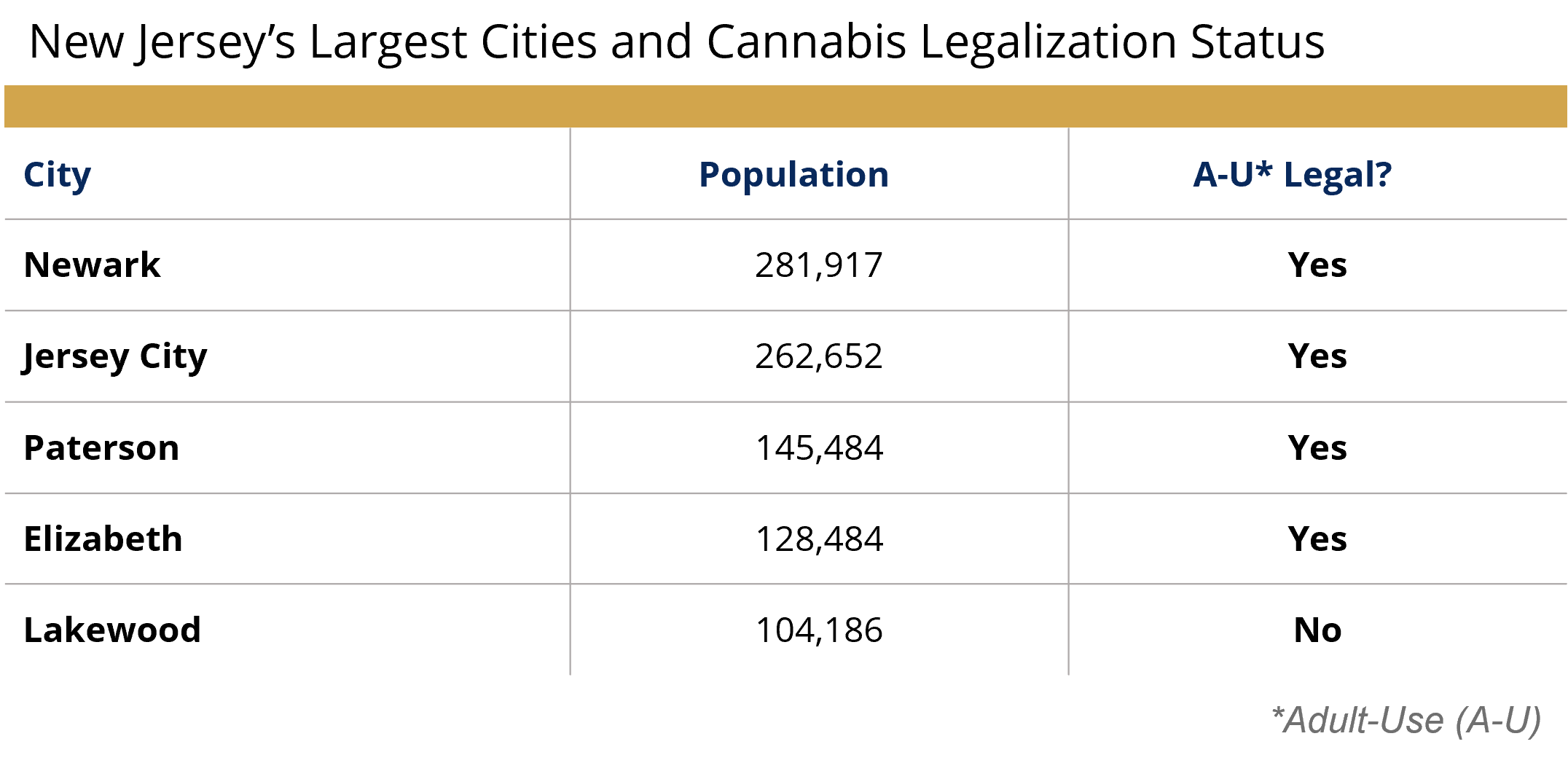
New Jersey's Largest Counties and Cannabis Legalization Status
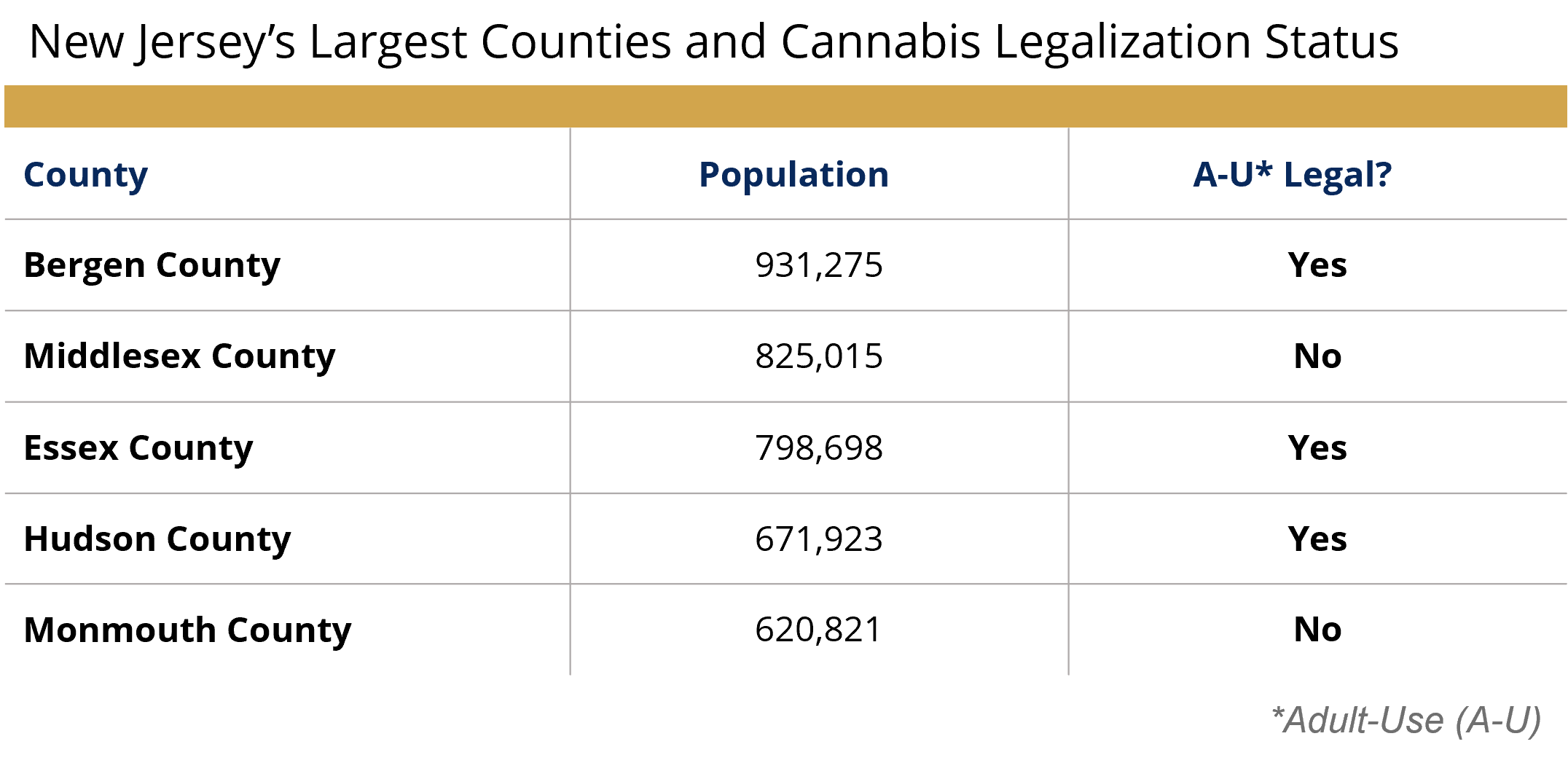
New Jersey Cannabis Dispensary Locations/Largest Cities
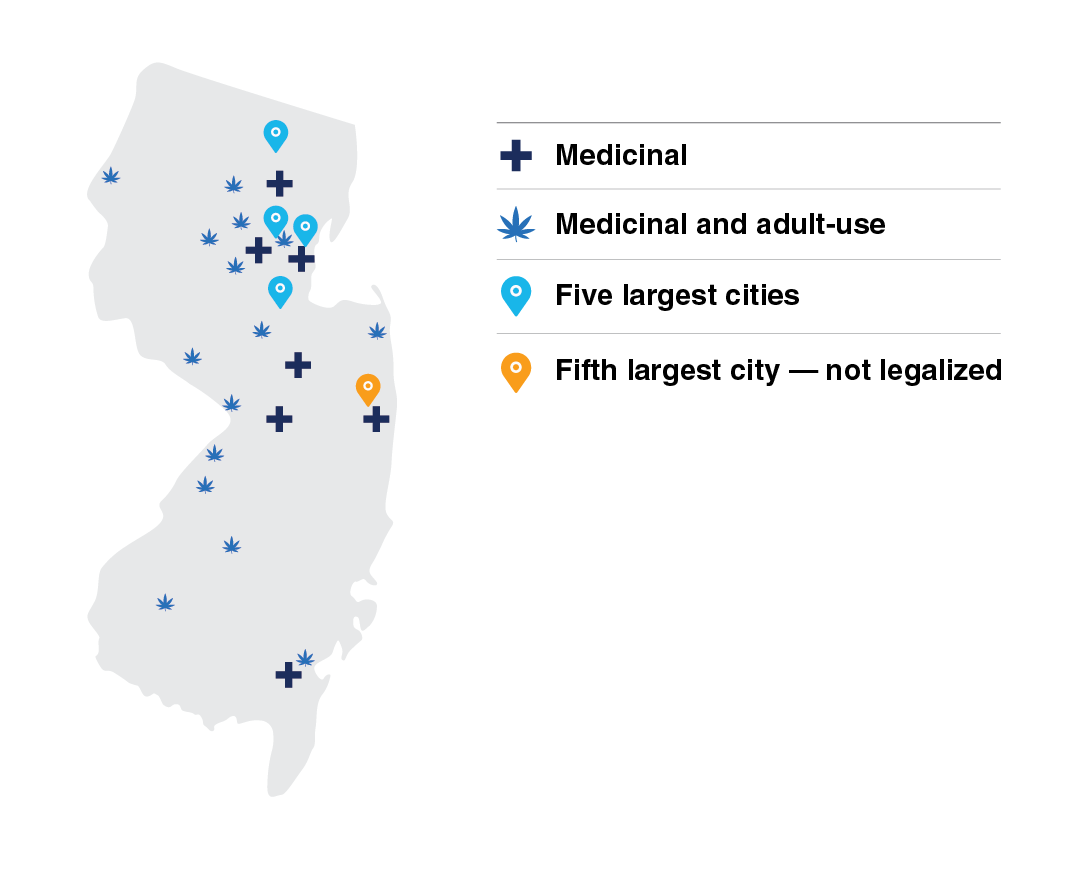
Diversity
As one of the most diverse states in the country ― with nearly 45% of its 8.9 million residents identifying as people of color. As such, the state has prioritized applications from social equity businesses, earmarking at least 30% of licenses for minorities, veterans or women.
Competition
Dispensaries with existing medical marijuana licenses had a head start when adult-use cannabis became legal. They only needed to:
- Notify the CRC as to their intent to sell adult-use cannabis;
- Prove they had adequate supply, and;
- Get approval from the local municipalities.
Additionally, they already had distribution systems in place so they could hit the ground running.
De novo, adult-use use dispensaries, on the other hand, have a longer, more involved license application process. As more people submit license applications, with any luck the process will become simplified and facilitate faster approvals.
With 130, 000 current registered medical cannabis patients, the New Jersey Cannabis Regulatory Commission (CRC) estimates an additional 800,000 adult-use customers with the overriding goal to encourage people to purchase and consume safely and legally.
Interstate marijuana commerce
Back in August, Gov. Phil Murphy long with NJ Senate President Nicholas Scutari filed a bill allow the governor to enter into agreements for interstate marijuana commerce with other states that have legalized cannabis. Unfortunately, this law can only be possible if federal law changes, or if the Justice Department issues guidance permission such activity.
Final thoughts on the New Jersey Cannabis Market
Whether a seasoned operator or someone new in this journey, networking with other people in the industry is a great way to become more knowledgeable about the industry and its issues.
Join cannabis-related associations to meet other likeminded professionals, attend webinars/seminars, network, and sign up for newsletters/alerts. At the national level, the National Cannabis Industry Association offers events, policy and advocacy, and detailed resources.
New Jersey also has several cannabis-specific organizations:
• New Jersey Cannabis Trade Association - Advocates for access for medical patients, social justice, and fair taxation
• New Jersey CannaBusiness Association - Promotes jobs, growth, and a diverse and sustainable cannabis industry
Follow these and other organizations on social media for more local information and events.
Access qualified help
There is tremendous potential, and risk, for operators and investors navigating the New Jersey cannabis market. MGO was one of the first national accounting and advisory firms to serve the cannabis industry in the U.S. We’ve been on the ground floor of every major market’s legalization. With a strong presence and multiple offices in the Metro area, we are in an optimal position to help operators and investors survive and thrive.
Our dedicated Cannabis Practice features subject matter professionals in every key area, including tax planning, compliance, controversy and 280E optimization, to financial and accounting best practices, to guidance raising capital or engaging in M&A activity.
Reach out to our team for a free consultation to see how our holistic approach to cannabis business best practices can help your New Jersey cannabis operation thrive.